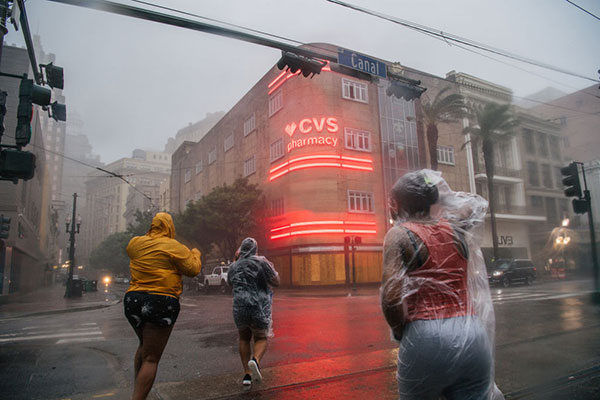Oil slips back after Hurricane Ida rolls through
31st August 2021 13:31
by Graeme Evans from interactive investor
Crude oil has dipped slightly today, with demand from refineries expected to slow due to damage caused by the powerful storm that hit Louisiana.

Brent crude has been forecast to stay near $75 a barrel after major hurricane disruption in the Gulf of Mexico provided investors with a reminder on the tightness of global oil supplies.
About 95% of oil and gas production in the Gulf was shut at the weekend due to the storm, but after rising 11% last week in anticipation of Ida's arrival the Brent price slipped to $73 today.
This fall-back was also in response to fears that the region's refineries will have to cut oil demand while they struggle to repair and restart processing facilities.
With the full picture on the scale of disruption unlikely to be known until an update from the US Energy Information Administration next week, UBS said the latest events added to the factors that will keep oil prices firm in the coming weeks.
- Alex Sebastian: we’re at the start of a long journey to higher rates
- Where I’m finding cheap stocks now
Chief investment officer Mark Haefele said: “The hurricane is a reminder that oil markets will be more vulnerable to such idiosyncratic events — including geopolitical disruptions — as demand outstrips supply.”
He expects global oil supply to run on average 1.5 million barrels a day below demand, even with OPEC+ ministers about to sanction an increase in output of 400,000 barrels a day at its meeting on Wednesday.
Haefele told UBS's wealth management clients that global oil inventories are already well below the five-year average and 2015–19 average and likely to fall further in the coming months as mobility improves.
He added: “Declining OPEC+ spare capacity will also keep the market tight though the second half of the year. Furthermore, Saudi Arabia has indicated that it may pause or reverse OPEC’s planned production increase if necessary.”
The upshot, according to UBS, is that structural tightness in the oil market is expected to persist in the remainder of 2021 as the global economy continues to re-open after the pandemic.
The bank is forecasting that Brent will climb to $75 a barrel or higher this year and is advising clients with a strong risk appetite to be long Brent.
Haefele said: “We are also positive on oil stocks which we think have yet to fully reflect the recovery in oil prices. Oil-related currencies will also stand to benefit from the overall positive picture.”
- Check out our award-winning stocks and shares ISA
- The world’s 10 biggest dividend payers in the second quarter of 2021
BP (LSE:BP.) shares have risen 3% in the past month but were off 4.5p at 297.85p today, while Royal Dutch Shell B (LSE:RDSB) shares dipped 15p to 1,434p, a fall of 1%.
A separate note from UBS has also looked at the potential exposure of reinsurers to the storm, with initial estimates pointing to this being a $20 billion event and one of the top 10 costliest hurricanes on record. The insured loss generated on Katrina in 2005 was $86.6 billion.
On top of sizeable European flood losses in July, this weekend's events will add to the debate about climate change and whether reinsurers are pricing business appropriately given that they are poised to exceed their catastrophe budgets for a fifth year in a row.
Shares in Lancashire Holdings (LSE:LRE) fell 3% today, with UBS believing the earnings of the FTSE 250 stock and Swiss Re will be the most impacted by the storm.
However, the bank reiterated its “buy” recommendations on Lancashire and Hiscox (LSE:HSX) as it said the earnings impact is manageable and there are no issues around solvency or dividends.
These articles are provided for information purposes only. Occasionally, an opinion about whether to buy or sell a specific investment may be provided by third parties. The content is not intended to be a personal recommendation to buy or sell any financial instrument or product, or to adopt any investment strategy as it is not provided based on an assessment of your investing knowledge and experience, your financial situation or your investment objectives. The value of your investments, and the income derived from them, may go down as well as up. You may not get back all the money that you invest. The investments referred to in this article may not be suitable for all investors, and if in doubt, an investor should seek advice from a qualified investment adviser.
Full performance can be found on the company or index summary page on the interactive investor website. Simply click on the company's or index name highlighted in the article.